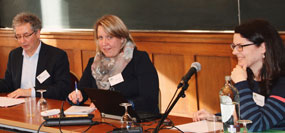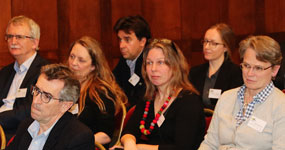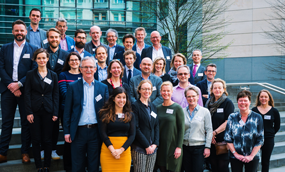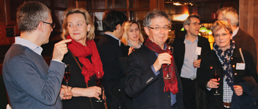Foreword by ENSR Chairman
Dr. Kim Møller
 The ENSR network comes to life when we work together on proposals and projects. In times when there are less tenders or when tenders involve only few ENSR-partners our network tend to become more and more absent in our minds. The annual ENSR days always refresh acquaintances but the Executive Committee would like to do more. Therefore, we have discussed staff exchanges across ENSR partner organisations. Realistically to support specific proposal writing or tender execution but with an underlying purpose of building and strengthening relations that can lead to even more — and more successful — cooperation on proposals and projects. You will learn more and you will see how this is part of a bigger plan including social media initiatives, etc., to strengthen our network and raise our profile.
The ENSR network comes to life when we work together on proposals and projects. In times when there are less tenders or when tenders involve only few ENSR-partners our network tend to become more and more absent in our minds. The annual ENSR days always refresh acquaintances but the Executive Committee would like to do more. Therefore, we have discussed staff exchanges across ENSR partner organisations. Realistically to support specific proposal writing or tender execution but with an underlying purpose of building and strengthening relations that can lead to even more — and more successful — cooperation on proposals and projects. You will learn more and you will see how this is part of a bigger plan including social media initiatives, etc., to strengthen our network and raise our profile.
back to top 
On the 23rd and 24th of March 2017, the Annual ENSR Days took place at the University Foundation in Brussels. This year’s theme was the application of innovative evidence-based research tools with a specific focus on (big) data. The seminar addressed the question as to whether these new tools can be used in applied social and economic research.
The meeting began in the afternoon of the 23rd with a joint session for all participants. Kim opened the proceedings by highlighting the importance of these occasions, and the role they play in strengthening cooperation within the network. Following his opening speech, an interesting and informative presentation was given by Mr Jörgen Gren, who works for the European Commission as a member of the cabinet of Andrus Ansip, Vice-President for Digital Single Market. He outlined the European Commission’s current policy regarding the digital market, which was followed by a lively discussion about the potential impacts of EU policy in this area for researchers.
Examples of the application of innovative methods were supplied by presentations of concrete projects by ENSR partners. The first presentation was given by Katrin Pihor of Praxis, who explained in detail the use of spatial data analysis and mobile positioning data for evaluating EU transport projects in Estonia. She discussed how using innovative data collection methods had led to unexpected results in the context of this particular project.
The second afternoon presentation was given by Christina Enichlmair from KMU Forschung Austria. This presentation was in relation to an impact evaluation carried out of SME support programmes offered in Austria. Specifically, she illustrated how a Propensity Score Matching (PSM) approach was applied to the project using annual accounts.

The next morning a workshop for ENSR directors and a practical training for researchers took place. The training session, organised by Martin Jenssen and Mate Vincze from VVA, focused on the application of big data, and how it can be incorporated by researchers in various projects. The participants were divided into several small groups and were instructed to design a research project that used one or more big data sources that were provided in a comprehensive list. Each group were then asked to present their projects to the rest of the group. The exercise served to introduce researchers to the broad applicability of such data collection methods.

back to top 
The theme of the ENSR Days 2016 was how to move the network forward by “raising the bar”. Our network holds a wealth of knowledge, and the discussion focused on the future directions for the network and its members to put the expertise to the best possible use. The Directors workshop provided an opportunity to reflect on the activities carried by the executive committee and the secretariat since the general meeting last year.
Along with the great improvements that have been made to the networks website and the bi-annual newsletter, the ENSR LinkedIn group is now being led by Jakob Stoumann of Oxford Research Denmark, so that it can further be used to generate visibility for the network. In relation to participating in tenders where partners are often not able to take the lead, an ‘expression interest in tender’ form has been developed. By doing this, partners will be made aware of other partners specific knowledge that can assist in the tender application process. Hopefully, this can lead to more successful tenders in the future.
The partners also reflected on the big data seminar, noting that and sharing knowledge is an important asset of the network. The seminar was very useful and we learn much from what others are doing and from the application of new methods from the examples provided. It is valuable to continue this kind of exchange during the ENSR days, and more exchange would be welcome via webinars or use modern media.
Kim also brought to the attention of the partners a new development in relation to working groups. These groups are still seen as very useful to the ENSR, and therefore efforts will be made to encourage their development further. The executive committee has therefore decided to have put some seed funding available to support this process, which was met with a positive response by the partners.

back to top 
As is the ENSR tradition, the opening day’s session was followed by our annual dinner at Scheltema, situated right in the heart of Brussels. Occupying a beautiful private room at the back of the restaurant, the ENSR members were treated to a fabulous three course meal, over which we were able to catch up, exchange experiences and strengthen the network through friendship. The evening closed with drinks at Café des Halles, one of Brussels many fine beer cafés.

back to top 
The dates for the 2018 of the Annual ENSR Days have now been confirmed. Next year’s event, to be held once again at The University Foundation in Brussels, will take place on the 19th and 20th of April. Be sure to make a note of the dates for your calendars!
back to top 
Mid-term evaluation of EU-OSHA Multi-annual Strategic Programme 2014-2020
Panteia has recently carried out an evaluation of EU-OSHA’s Multi-annual Strategic Programme 2014-2020 (MSP). The evaluation contains both a retrospective review of the MSP along with a forward approach, considering whether the MSP will remain a valid document for the coming six years. To determine this, Panteia considered whether the policy context outlined in the MSP remains relevant, along with the relevance, coherence, effectiveness, efficiency and EU Added value of the MSP in the process of EU-OSHA short and medium-term planning. Panteia is part of a consortium along with Oxford Research and IKEI engaged in the provision of evaluation services for EU-OSHA.
back to top 
Ex-post evaluation of the Second European Survey of Enterprises on New and Emerging Risks (ESENER-2)
In cooperation with Panteia and Oxford Research, IKEI has started the evaluation of ESENER-2, which it is intended to assess the following issues:
- Appropriateness of the research design
- How successfully the research design was translated into procurement
- The implementation of the activity
- The extent to which success was achieved in getting visibility for the project
- Indications of impact and potential for sustainability
The project will go on until next October 2017.
Unfortunately, this will be one of the final assignments within the FWC signed by the Consortium, as the EU Agencies have adopted a common contracting approach for their evaluation activities and launched a new call for tenders.
back to top 
Research into the Impact of Interruptions in Business Support
The SBRC was commissioned by the York, North Yorkshire and East Riding Growth Hub in the UK to investigate the effect of discontinuities or interruptions in business support availability on the performance of enterprises, paying particular attention to scale-up businesses. The project is led by Professor David Smallbone, working with Professor Robert Blackburn and Eva Kasperova.
back to top 
Evaluating the uptake and impact of participation in the European Framework Programmes for Research in the Member States
The validation workshop for the study titled “Evaluating the uptake and impact of participation in the European Framework Programmes for Research in the Member States” was organised at DG RTD’s premises on 19th May 2017. The workshop gathered a group of 34 national experts, independent consultants and Commission representatives including a number of ENSR partners. The main purpose of the workshop was to discuss and validate study findings, using the knowledge and experience of engaged experts and consultants. Oxford Research and CSES lead this evaluation project. The overarching objective for the study is to assess the uptake and impact of participation in the European RTD Framework Programmes (“FPs”) in 28 EU Member States (“MS”) and 13 Associated Countries (“AC”), i.e. a total of 41 countries.
The study has been commissioned to support the European Commission in better communicating the European Added Value (EAV) of the Framework Programmes in each MS and AC. It is prepared with a view to help to further the European Commission’s understanding of the impact of the FPs and facilitate the design of future EU RTD programmes in order to maximise their future impacts. It will also feed in to the Interim Evaluation of Horizon 2020.
The workshop was divided up into five sessions, corresponding to the evidence base gathered through the study, including:
- General trends and patterns in MS/AC national research and innovation landscape and policies during the past 15 years
- Evolution of participation patterns in Framework Programmes in each MS/AC during the last 15 years
- Longitudinal and cumulative impacts of FP participation on Member States and Associated Countries
- Validation of country reports and findings for study and a final conclusion session.
During the discussions it was concluded that in general Framework Programmes have a significant impact on research activities in all EU and AC countries. As a result of those programmes, significant advancement is achieved for European science and innovation. This in turn increases the competitiveness of all European countries. In addition, the discussions clearly indicated that the contribution of the programmes is significant in both quantitative as well as qualitative terms. However, there are some challenges in assessment of the short and especially long-term impact that should be addressed in the future.
back to top 
The influence of a regional banking system on SMEs credit availability
The SBRC is collaborating with colleagues at the Institut für Mittelstandsforschung (IfM) Bonn, Germany, on a comparative study of the influence of a regional banking system on SMEs’ credit availability in the UK and Germany. The project sheds light onto lending criteria and credit approval process for loans, the internal and external processes followed, the qualitative and quantitative criteria banks consider in decision-making and the main reasons for successful and failed applications. The SBRC end of the project is led by Professor Robert Blackburn, working with Eva Kasperova.
back to top 
Guidance notes on policy strategies and objectives for the inclusive entrepreneurship online toolkit
This work, led by Professor Robert Blackburn and Eva Kasperova of the SBRC, is a continuation of the inclusive entrepreneurship project commissioned by the OECD-EC. The client is developing an online toolkit for inclusive entrepreneurship policy strategies and objectives aimed at policy makers. The objective is to produce a set of guidance notes to accompany the toolkit.
back to top 
Impact assessment of EU-funded transport investments
Praxis has completed the impact assessment of the EU’s structural funding of transport during programme periods 2007-2013 and 2014-2020. The research was commissioned by the Ministry of Finance of Estonia. The objective of this study was to provide an independent assessment of the purposefulness, efficiency, effectiveness, impact and sustainability of structural fund investments made in the Estonian transport sector during the 2007-2013 programming period as well as the estimated impact and sustainability of transport and mobility development projects falling in the framework of the 2014-2020 programming period. The scope of the evaluation included structural fund investments planned for airports, waterway, port, road, railway and light traffic infrastructure during the 2007–2013 and 2014–2020 programming periods. This study focused on 79 projects from the 2007-2013 programming period. Click link for further details.
back to top 


 The ENSR network comes to life when we work together on proposals and projects. In times when there are less tenders or when tenders involve only few ENSR-partners our network tend to become more and more absent in our minds. The annual ENSR days always refresh acquaintances but the Executive Committee would like to do more. Therefore, we have discussed staff exchanges across ENSR partner organisations. Realistically to support specific proposal writing or tender execution but with an underlying purpose of building and strengthening relations that can lead to even more — and more successful — cooperation on proposals and projects. You will learn more and you will see how this is part of a bigger plan including social media initiatives, etc., to strengthen our network and raise our profile.
The ENSR network comes to life when we work together on proposals and projects. In times when there are less tenders or when tenders involve only few ENSR-partners our network tend to become more and more absent in our minds. The annual ENSR days always refresh acquaintances but the Executive Committee would like to do more. Therefore, we have discussed staff exchanges across ENSR partner organisations. Realistically to support specific proposal writing or tender execution but with an underlying purpose of building and strengthening relations that can lead to even more — and more successful — cooperation on proposals and projects. You will learn more and you will see how this is part of a bigger plan including social media initiatives, etc., to strengthen our network and raise our profile.



 My name is Kristine Kryger and I joined Oxford Research A/S (Denmark) as Administrator in April 2017. I hold Master degrees in Political Science and International Relations from University of Essex (UK) and University of Copenhagen (DK). My professional background includes positions such as Office Manager in an Investment firm, Campaign Manager at Dan Church Aid, and Co-founder and Vice Chair at Danish Refugee Council Youth Association. I have previously worked with administration in general and managed digital communication strategies for various companies.
My name is Kristine Kryger and I joined Oxford Research A/S (Denmark) as Administrator in April 2017. I hold Master degrees in Political Science and International Relations from University of Essex (UK) and University of Copenhagen (DK). My professional background includes positions such as Office Manager in an Investment firm, Campaign Manager at Dan Church Aid, and Co-founder and Vice Chair at Danish Refugee Council Youth Association. I have previously worked with administration in general and managed digital communication strategies for various companies.